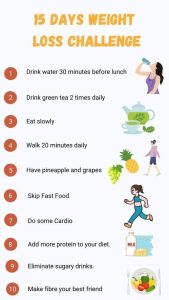The pursuit of a healthy weight is a journey, not a destination. It’s not just about dropping a few pounds; it’s about gaining control over your health, well-being, and overall quality of life. While the year 2024 may bring new trends and innovations in the world of weight loss, the fundamentals remain constant – a commitment to sustainable practices for long-term success. This blog post delves into the top strategies for weight loss management in 2024, dispelling myths and offering practical advice backed by scientific evidence.

Shifting Your Mindset: Embracing a Holistic Approach
Weight loss is not solely about a number on the scale; it’s about building a healthy relationship with your body and mind. Forget the quick fixes, the restrictive diets, and the unrealistic expectations. Instead, focus on creating sustainable lifestyle changes that nourish both your physical and mental well-being.
a. Prioritize Mindful Eating:
*Listen to your body’s signals: Hunger and satiety cues are your body’s way of communicating its needs. Learn to distinguish between genuine hunger and emotional eating.
*Enjoy your food:Mindful eating encourages you to savor each bite, appreciate the flavors, and pay attention to your body’s responses.
*Practice portion control: Mindful eating doesn’t mean depriving yourself. It’s about making conscious choices about the quantity and quality of foods you consume.
*Embrace a diverse diet:Focus on nourishing your body with a wide variety of fruits, vegetables, lean proteins, whole grains, and healthy fats.
b. Integrate Body Acceptance and Self-Compassion:
*Self-love is essential:Weight loss journeys can be challenging, but it’s vital to practice self-compassion and celebrate your progress, even the small wins.
*Recognize your worth beyond your weight:Your value and worth are not defined by a number on the scale. Embrace your unique beauty and strengths.
*Challenge negative self-talk: Replace self-criticism with positive affirmations and focus on your body’s incredible capabilities.
2. Fueling Your Body: The Power of Nutrition
Nutrition plays a crucial role in weight management, providing your body with the energy and nutrients necessary for optimal functioning. Here’s how to optimize your dietary choices:
a. Focus on Whole, Unprocessed Foods:
* Lean proteins: Choose lean protein sources like chicken, fish, tofu, beans, and lentils.
*Healthy fats:Incorporate avocados, nuts, seeds, olive oil, and fatty fish into your diet.
*Whole grains: Prefer whole grain bread, brown rice, quinoa, and oats over refined grains.
*Fruits and vegetables: Aim for a rainbow of colors to maximize nutrient intake.
b. Mindful Snacking:
*Plan ahead:Keep healthy snacks readily available to avoid impulsive unhealthy choices.
*Choose nutrient-rich options:Opt for fruits, vegetables, yogurt, trail mix, or nuts.
*Hydrate regularly:Water can help curb cravings and keep you feeling full.

c. Understanding Macronutrients:
* Protein: Essential for building and repairing tissues, and it promotes satiety.
*Carbohydrates: Your body’s primary source of energy, choose complex carbohydrates over refined sugars.
*Fats:Provide energy, support hormone production, and aid in nutrient absorption.Best Weight Loss Programs for 2024
3.Building a Foundation: The Role of Physical Activity
Exercise isn’t just about burning calories; it’s about improving your overall health, boosting metabolism, reducing stress, and enhancing your overall well-being.
a. Find an Activity You Enjoy:
*Explore different options:Try dancing, swimming, hiking, cycling, yoga, or team sports.
*Make it a social activity: Join a fitness class or workout with a friend for motivation.
*Listen to your body: Choose activities that feel good and avoid pushing yourself too hard.
b. Embrace a Balanced Approach:
*Cardiovascular exercise:Engage in activities like running, swimming, or biking to improve heart health.
*Strength training:Incorporate exercises like weightlifting, bodyweight training, or resistance bands to build muscle.
*Flexibility exercises: Practice yoga or stretching to improve range of motion and reduce muscle tension.
c. Set Realistic Goals:
*Start small and gradually increase intensity:Don’t overwhelm yourself with ambitious goals.
*Focus on consistency:Aim for at least 30 minutes of moderate-intensity exercise most days of the week.
*Celebrate your progress: Acknowledge your achievements and recognize the positive impact of your efforts.
4. Lifestyle Adjustments: Cultivating Sustainable Habits
Weight management is a lifestyle shift, not a temporary fix. Integrate these simple yet powerful adjustments into your daily routine for lasting results.
a. Prioritize Sleep:
* Aim for 7-9 hours of quality sleep:** Sleep deprivation can disrupt hormones that regulate appetite and metabolism.
* Create a relaxing bedtime routine:** Engage in calming activities like reading, taking a warm bath, or meditation.
*Optimize your sleep environment:** Ensure a dark, quiet, and cool room for optimal sleep.
b. Manage Stress:
*Identify your stressors: Understand what triggers your stress and develop strategies to manage them.
* Practice stress-reduction techniques: Explore activities like yoga, meditation, deep breathing exercises, or spending time in nature.
* Seek support when needed: Don’t hesitate to reach out to a therapist or counselor for help navigating challenging emotions.
c. Cultivate a Supportive Network:
* Surround yourself with positive influences: Connect with family, friends, or support groups who encourage healthy habits.
*Join online communities:Find online forums or groups dedicated to weight loss and wellness.
* Seek professional guidance: Consider working with a registered dietitian, certified personal trainer, or therapist for personalized support.
5. Debunking Common Myths: Separating Fact from Fiction
The world of weight loss is often filled with misinformation and misleading claims. Here’s how to navigate the noise and make informed decisions:
a. Fad Diets Don’t Work:
* Restrictive diets: They tend to be unsustainable and often lead to nutrient deficiencies.
* Quick fixes: They focus on short-term results and don’t address the root causes of weight gain.
*Focus on long-term habits: Creating sustainable lifestyle changes is key to long-lasting success.
b. Calorie Counting Isn’t Always Necessary:
* Intuitive eating: Learning to listen to your body’s hunger and satiety cues is a powerful tool.
* Focus on nutrient density: Prioritize whole, unprocessed foods rich in nutrients while mindful of portion sizes.
c. Weight Loss Isn’t Linear:
*Plateau periods: It’s normal to experience periods of stalled weight loss, but it doesn’t mean you’re failing.
* Focus on progress: Celebrate your achievements and recognize the positive changes in your body, even if the scale isn’t moving.
6. The Role of Professional Guidance
* Registered Dietitian: A registered dietitian can provide personalized meal plans and nutritional counseling.
* Certified Personal Trainer:A certified personal trainer can create a safe and effective workout program tailored to your fitness level and goals.
* Therapist: A therapist can help address emotional and behavioral patterns that may contribute to unhealthy habits.
7. Celebrating Progress: Recognizing Your Achievements
Weight loss isn’t a race. It’s a journey of self-discovery, self-love, and continuous improvement. Celebrate your progress along the way, no matter how small:
* Track your achievements:Keep a journal or log to monitor your progress and celebrate milestones.
* Reward yourself with non-food rewards: Treat yourself to a massage, a new workout outfit, or a weekend getaway.
* Focus on the positives:Acknowledge the positive changes in your body, energy levels, and overall well-being.
8. Embracing a Life of Wellness
Weight loss management is not a one-size-fits-all approach. It’s about finding what works best for you, listening to your body, and prioritizing your overall well-being. As you embark on this journey, remember that you are not alone. There is a wealth of resources available to support you, and countless people have achieved success by embracing a holistic approach to their health and wellness.
Closing Thoughts
Weight loss management in 2024 is about embracing a sustainable lifestyle that nourishes both your body and mind. Focusing on mindful eating, balanced exercise, and cultivating healthy habits will lead to long-term success. Remember, it’s not about achieving a specific number on the scale, but about living a life filled with energy, vitality, and well-being. The journey may have its challenges, but with determination, self-compassion, and the right support, you can achieve your weight loss goals and embrace a healthier, happier you.